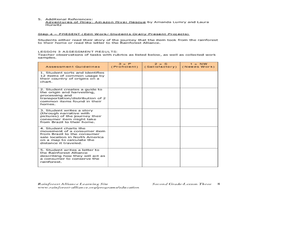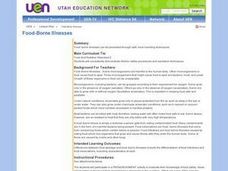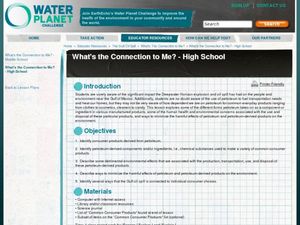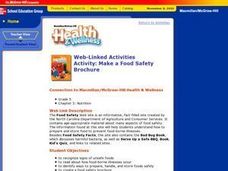Curated OER
Products from the Rainforest
Second graders write a story about the journey a food has from the rainforest to your table. In this food lesson plan, 2nd graders research different foods and products that come from the rainforest and discover how it ended up in their...
Curated OER
Food-Borne Illnesses
Use this lesson to have your charges consider the differences between food spoilage and food-borne illnesses including the differentiation of food infections and food intoxication, including characteristics of each. Some excellent...
Curated OER
Soil: Food Mapping
Young scholars examine the concept of food mapping . In this agriculture instructional activity, students explore food and agriculture systems in the United States in the past and today. Young scholars complete food mapping activities.
Curated OER
What's the Connection to Me?
Students discuss the impact of oil spill to the environment and to their daily lives. In this environmental science instructional activity, students research the pros and cons of petroleum based products. They share their findings in class.
Curated OER
Petroleum Poisons
Students discover how harmful petroleum distillates are that are found in the home. They demonstrate how to collect information about consumer products. They also ask their parents about the safety of the cleaning supplies used in their...
Curated OER
Eating for Your Future
Students brainstorm ways to live healthy. In this health science lesson, students recipes that are healthy and appealing. They compile all recipes and develop a class cookbook.
Curated OER
Daily Food Diary of an Elderly Person
In this health instructional activity, students keep a food diary for an elderly person that could be a friend or relative. Each entry needs to be recorded accurately.
Curated OER
European Agriculture
Sixth graders explore differences between European agriculture and American agriculture. In this agriculture lesson, 6th graders investigate the role that cultural differences play in agriculture and how these cultural differences affect...
Curated OER
My Farm Web
Third graders explore agriculture by viewing video clips in class. In this farm animal activity, 3rd graders identify the animals mostly eaten that come from farms and the types of food they consume before they are eaten by us. Students...
Curated OER
A Teeth Changing Experience
Students research human health by reading an educational story in class. In this oral health lesson, students identify the importance of brushing their teeth and consuming calcium. Students read the book A Teeth Changing Experience and...
Curated OER
Flambe Elements
Eighth graders discuss atoms and electrons as well as atoic structure. They view atomic structure via the computer. Students watch a demonstration in which the teacher demonstrates glass tubing turning yellow in a Bunsen Burner flame....
Curated OER
Oklahoma's Berry Best
Ask your learners to complete activities related to Oklahoma's agriculture, berries in particular. The lesson is cross-curricular and has class members investigate an article about berries, write an acrostic poem, and discuss new...
Curated OER
Mission Meals
Young scholars engage in a investigation of the types of meals that astronauts eat in space while examining the types of nutritional elements needed for optimum physical tasks in space. They are given different foods and then document...
Curated OER
Calories
Young scholars explore calories. In this lesson about calories, students practice counting and recording calories. Young scholars use a sample Calorie Calculation Chart to record how many calories consumed in one day. Students do an...
Curated OER
Environmental Hazards
Students identify environmental hazards on a simulated field trip. They analyze the exposure and suggest methods to eliminate or reduce exposure to toxic sources.
Curated OER
Make a Food Safety Brochure
Students create brochures that inform their families how to prepare and store food to prevent food-borne illnesses. They research food safety facts and proper food-handling techniques on the internet.
Curated OER
People and the Ocean
Students view a demonstration of the ocean and what we can do to help it, and also identify seafood items that students would order on a menu. In this ocean lesson plan, students learn how people are connected to the ocean and how we can...
Curated OER
Water Quality and Dissolved Oxygen
Students investigate the relationship between dissolved oxygen and organic materials and aquatic organisms. This is a 3-lesson series in which students explore dissolved oxygen and then design an experiment testing the effects of changes.
Curated OER
Genetically Modified Foods
High schoolers explain what genetically modified foods are and how they are created. Students use appropriate vocabulary to describe and effectively discuss the benefits of, and potential risks of, genetically modified foods.
Curated OER
Save the Earth: It's Everyone's Home!
Students demonstrate how to make earth-smart choices. In this environmental awareness lesson, students listen to a short lecture on environmentally friendly products. Students invent an environmentally friendly product and complete an...
Curated OER
Fit With Fiber
Sixth graders investigate the nutritional value of different types of cereal. They take a survey of students that ate breakfast and create a circle graph with the results. Students examine the nutritional information on the sides of the...
Curated OER
4-H Swine Activity Page
In this 4-H swine activity page worksheet, students study the parts of a hog, complete a swine word search, complete a career scavenger hunt, and develop a swine budget. They also read pig facts and learn how to select a hog while...
Curated OER
Energetic Energy: A Child?s Guide to Responsible Energy Use
Students explore how energy transforms into heat. In this energy lesson students create models and find a need for fuel to make a Stirling engine.
Curated OER
Pollution Prevention in Schools
Students review P2 concepts they learned in previous lessons and explore how to reduce the pollution in their school. They also examine ways to conserve energy.

























